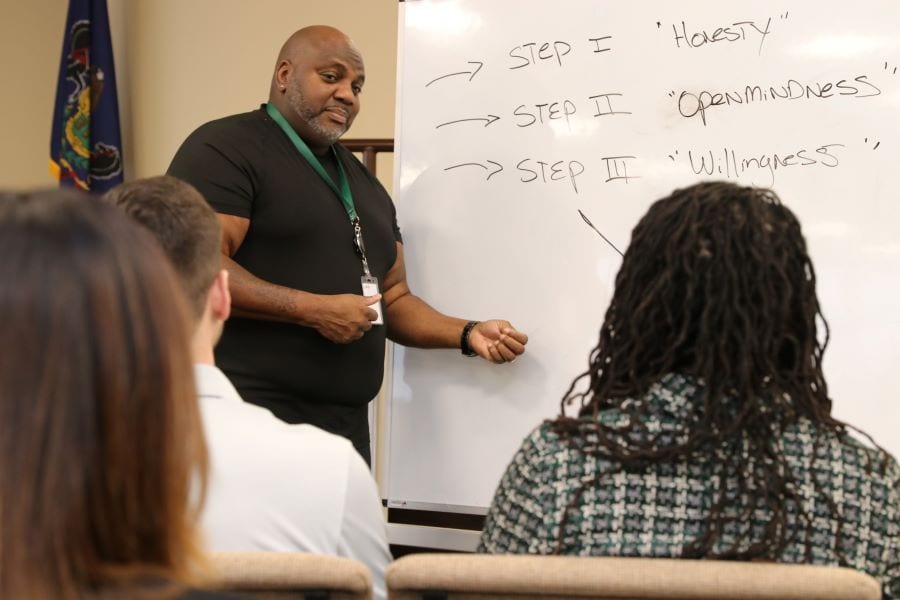10 Questions to Ask Before Choosing a Rehab Center

It is a major step when an individual with a substance use disorder recognizes that their drug use has become a problem and decides to seek help. This is a time for positivity and encouragement, as they will be taking their first steps toward a life of sobriety. When this moment happens, it is crucial to act quickly to find proper treatment, in the chance their motivation falters and they change their mind. However, while time is of the essence, a person should never rush the process without first doing a little research on the subject.
Choosing a rehab center is a critical decision that will shape an individual’s entire journey toward recovery for better or for worse. Picking the right rehab center can easily mean the difference between a successful treatment experience that leads to lifelong recovery, or a negative experience that causes an early relapse. For this reason, it is important to research what options are available to a person, and part of that entails finding answers to a few key questions.
Before selecting a rehab center, there are ten questions that every potential patient or their loved ones should first ask about the facility.
1. Is the rehab center licensed and accredited?
Not all rehab centers are created the same. When searching for options, it is important to make sure that the treatment facility is licensed and accredited. This ensures that they hold themselves to a higher standard of care, guaranteeing that their patients will get the help they need, with the utmost care, effectiveness and safety.
It is also worth asking about what credentials the staff members hold. Just because a rehab center is accredited, it does not mean that the same staff are working now as they were when the facility received the accreditation. As a result, the level of care, support and experience onsite could differ.
2. What programs are available?
No one program is perfect for every single patient, but rather each patient has specific programs and treatment plans that are right for them. For some individuals, detox and inpatient care may be essential as their first phase of care. For others, partial hospitalization programming and/or outpatient may be a better fit, especially if they are not in need of detox.
Before choosing a rehab center, a patient needs to decide what kind of program or programs they are looking for in a facility. Uncovering this means learning about a rehab center’s options for:
- Inpatient care
- Outpatient care
- Dual Diagnosis treatment
- Detoxification (detox)
- Therapy
- Family counseling
A well-equipped rehab center should have multiple options available so they can accommodate a wider range of patients. This does not mean a patient should rule out smaller facilities. Even if the rehab center is small, they may offer certain specialty programs that fit the patient’s needs, such as dual diagnosis treatment.
3. How long do the programs last?
The duration of a recovery program has been shown to play a role in the effectiveness of treatment. Long-term treatment or a full continuum of care is always more effective, allowing the individual the time they need to break free from addiction and begin rebuilding their life. Inpatient care, for instance, can range anywhere from 28 days to a year, meanwhile outpatient care, which a less restrictive option, could range from 3 months to a year. A patient should know what options are available to them at each rehab center they are considering.
4. How does the rehab center manage detox?
Every facility takes a slightly different approach to handling the difficult process of detoxification in the beginning stages of treatment. While certain situations may call for commonly used interventions across the board, such as withdrawal medications being necessary to safely treat an opioid addiction, other situations require very specific protocols. This is particularly true in cases of dual diagnosis and pre-existing medical conditions. For instance, if a patient is suffering from high blood pressure and requires medication, their detox protocol may differ as some medication combinations have proven to have adverse effects. When choosing a rehab center, it is imperative to give a thorough medical history to the staff, so they may treat you accordingly.
5. How successful is the rehab center?
As nice as it would be for every rehab center to be a grand success, that is simply not the case. Be it from the staff, programming, beliefs or amenities, rehab centers have different reputations and success rates. When a patient is considering a rehab center, they should research the facility’s success rate and the effectiveness of their program and staff. This is to ensure that the patient has the best possible chance for a life…recovered.
6. What type of environment does the rehab center offer?
To make the recovery process more effective, it is important that a patient be comfortable with the environment and their surroundings. Which factors are most vital will vary between patients, but some questions that are worth considering include:
- How friendly are the staff?
- What amenities are available?
- How well can a facility accommodate special needs?
- Does the center use a therapeutic community model?
- Is the premise close to nature?
- Will my loved ones be able to visit?
7. Does the program consider nutritional needs?
In many situations when an addict enters a rehab center, they have been neglecting their own well-being and are in poor health. Malnutrition is common for patients when they first arrive at treatment and carries with it a collection of symptoms such as depression, sleeplessness, lack of energy and mood swings. These are all influencing factors that encourage substance abuse while also serving as barriers to recovery, because it feeds addictive urges while making it difficult to interact with the patient.
A rehab center should be equipped to handle this situation by having a dietician on staff or within easy reach. They will assess each individual to determine their dietary needs, giving them a better chance for a successful treatment experience and ongoing recovery.
8. What is the cost of treatment?
While the primary goal of a treatment facility is to help the suffering individual find recovery, rehab centers need the proper funds and/or finances to operate accordingly. For this reason, there is a cost for treatment that prospective patients should consider when they are choosing a rehab center. Finances will also play a role in which programs they will be able to participate in and for how long. For example, outpatient care is cheaper than inpatient rehab because it does not include detox or the same regiment of therapeutic practices, yet it is not always the best option for the individual.
Fortunately, many insurance plans offer partial or complete coverage for treatment. Nevertheless, it is necessary to make certain that the rehab center a patient is considering will accept their plan. Furthermore, even if an individual does not have insurance or a plan that can cover enough of the cost, some facilities offer scholarships programs to ensure that more people have access to effective treatment options.
9. Does the rehab center offer any life skills training?
A substance use disorder can be the result of a variety of influencers. This can include genetics, family dynamics, peer groups and social status, among many others. When an individual has made the decision to get help, each of these factors should be considered during the treatment process to enable a life of recovery.
For instance, if a person comes from a family where large amounts of alcohol are present, they may want to consider a sober living community after treatment. Or, if the pressures of their professional life influence their urge to use, they may want to consider speaking with their supervisor about a change in responsibilities before returning to work.
Additionally, many people who come to treatment have never had the opportunity to receive a higher education or proper vocational training, making it more difficult to support themselves and a life of recovery. Something as simple as completing a resume or budgeting finances may come difficult, especially to young people in recovery.
To combat this, some rehab centers offer life skills training, so the patient is better able to address obstacles outside of treatment. This can include finding a job, returning to school or removing oneself from negative environments, both familial and social.
10. Does the rehab center offer aftercare?
Addiction is brain disease that unfortunately cannot be cured. However, it can be managed daily with commitment and dedication to a life of abstinence and recovery. While a patient may be safe from addiction while under the care of a rehab center, they will certainly be faced with temptation and obstacles once they return home.
As such, many rehab centers offer aftercare programs to give additional help to their former patients. These differ in nature but are intended to go beyond basic treatment by helping the individual continue to build a healthier life for themselves. Some rehab centers do this by having the patient return for periodic checkups, but most handle aftercare by connecting them other programs, such as IOP and private therapists. Additionally, patients are connected with local recovery communities within their area, such as AA and NA.
If you or someone you love is currently in need of treatment for a substance use disorder, please consider these 10 questions before choosing the right rehab center for you. While time is of the essence, a positive or negative treatment experience can impact how the individual fares in recovery.
At Brookdale, we have purposefully designed a treatment program that is tailored to meet the individual needs of each patient that comes to us. Offering detoxification, residential treatment, an array of therapeutic modalities and world-class amenities, we ensure you or your loved one will receive the highest standard of effective treatment.
Please call us today at 855-575-1292 to speak with one of our trusted Admissions Specialists and discover your life…recovered.

